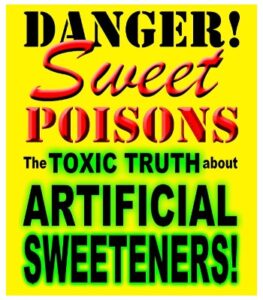
I used to use them too, thinking they were better when compared to sugar since it’s what I was taught in school when I was studying to be a dietitian. If dietitians use and recommend them, it is no wonder we believe they’re good for us, right? Well, as research repeatedly shows, there may not be any good reasons to support the notion that artificial sweeteners are beneficial to us. They are far from being healthy as advertised on TV because they mess up our metabolism, create havoc in our gut, fuel sugar addiction, are dangerous with several side effects and raise our blood sugars.
Common Artificial Sweeteners
Here are the most popular (and dangerous) artificial sweeteners on the market today.
- Aspartame (Equal, NutraSweet) It’s currently used in more than 6,000 consumer foods and drinks, and over 500 prescription drugs and over-the-counter medications. It hides in places we don’t expect! Because aspartame isn’t heat-stable, it’s typically found in drinks and foods that haven’t been heated. Common side effects of aspartame include headaches, migraines, mood disorders, dizziness and episodes of mania. Comprising phenylalanine, aspartic acid, and methanol, these substances can stay in the liver, kidneys and brain for quite some time.
- Sucralose (Splenda) Sucralose is 600 times sweeter than sugar. Sucralose, derived from sugar, was originally introduced as a natural sugar substitute. However, in reality, it’s a chlorinated sucrose derivative. Yes, chlorine, one of the most toxic chemicals on the planet. Despite its zero-calorie content, Splenda triggers an increase in insulin levels, which signal the body to hold on to fat reserves or to store even more fat on your beautiful body
- Acesulfame K (ACE K, Sunette, Equal Sweet ‘n Safe) Composed of a potassium salt that contains methylene chloride, Acesulfame K is routinely found in sugar-free chewing gum, alcoholic beverages, candies and even sweetened yogurts. It’s often used in combination with aspartame and other non-caloric sweeteners. ACE K is heat-stable and routinely found in highly processed foods and baked goods. The human body can’t break it down, and it’s believed to negatively affect the metabolism.
- Saccharin (Sweet ‘N Low, Sweet Twin) is the primary sweetener for children’s medications, including chewable aspirin, cough syrup, and other over-the-counter and prescription medications. It’s believed that saccharin contributes to photosensitivity, nausea, digestive upset, tachycardia and some types of cancer.
Where do these artificial sweeteners hide?
People are often surprised at how often dangerous artificial sweeteners are included in prepared foods, medications, and beverages. Here are a few surprising examples of where to check for the dangerous sweeteners mentioned above.
| Toothpaste and mouthwash | Children’s chewable vitamins |
| Cough syrup and liquid medicines | Chewing gum |
| Zero-calorie waters and drinks | Alcoholic beverages |
| Salad dressings | Frozen yogurt and other frozen desserts |
| Candies | Baked goods |
| Yogurt | Breakfast cereals |
| Processed snack foods | “Lite” or diet fruit juices and beverages |
| Prepared meatse | Nicotine gum |
SO WHAT ARE YOUR ALTERNATIVES?
So, what are your options when you have a sweet tooth? ll natural sweeteners — including maple syrup, coconut sugar, stevia, fruit purees and raw honey — are great, healthy substitutions.
| Raw Honey (1 tablespoon – 64 calories) | Stevia (0 calories) |
| Dates (1 Medjool Date – 66 calories) | Coconut Sugar (1 tablespoon – 45 calories) |
| Maple Syrup (1 tablespoon – 52 calories) | Blackstrap Molasses (1 tablespoon – 47 calories) |
| Banana Puree (1 cup – 200 calories) | Brown Rice Syrup (1 tablespoon – 55 calories) |
Keep packets of stevia (PURE SWEET LEAF or DROPS) with you so you don’t have to resort to artificial sweeteners provided by restaurants and cafes.
Living healthy doesn’t mean you have to give up sweets entirely; it just means you need to replace unhealthy refined sugars and artificial sweeteners with these natural sweeteners. Each of these has the best use, and some recipe modification will be necessary. Explore and find what natural sweetener you like best.
